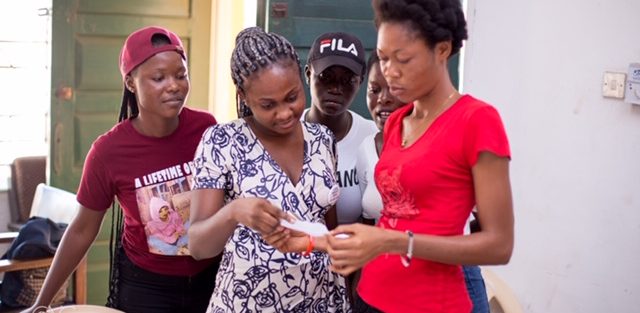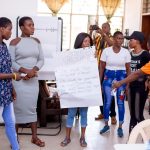It is a rainy Tuesday morning, 15 year old Afi carries her 6 month old son, Kojo, as she marches to her local CHPS compound. Despite the heavy rainfall, Afi is determined. After one pregnancy at 14, she is intent on preventing any other pregnancies until she is ready. Before Kojo, Afi did not know that there were other ways to prevent pregnancy. She had only heard bad things about contraceptives; that they destroy your womb and you’ll never be able to have children. In a conversation with her friend Ewrama, Afi learnt about her reproductive health rights and about methods of contraception. Ewrama received comprehensive sexuality education (CSE) during a workshop in her community. Now Afi knows more about how to plan her pregnancies and has made informed decisions about her health.
Afi’s story is far from unique. There are many adolescents girls who face tremendous challenges in accessing sexual and reproductive health information which has a great impact on their sexual and reproductive health (SRH) outcomes. Adolescent girls like Afi are vulnerable as a result of socio-economic factors, including education, income and social background. Adolescent girls in rural Ghana are at risk of contracting sexually transmitted infections; unwanted pregnancies, and unsafe abortions also negatively impact adolescent health. Gender inequality gaps and societal pressures can also create barriers to adolescent girls attaining good health and thriving in life.
The lack of accessible, gender-specific SRH education may leave adolescents vulnerable to harmful sexual behaviours and sexual exploitation. It is important that they are informed and empowered to protect themselves from such dangers and make informed decisions about their health.
Adolescents often receive conflicting information and views from their peers; teachers and family members. Comprehensive sexuality education (CSE) is dispelling misconceptions in component of this education. As adolescents make the transition from childhood to adulthood it is important that they receive accurate information on topics such as: female anatomy; personal growth and personal development; decision making; negotiation in sexual encounters and contraceptive methods. CSE empowers adolescent girls to make informed decisions about sex, sexuality and relationship throughout their lives and into womanhood.
With funding from the United Nations Population Fund (UNFPA), the Alliance for Reproductive Health Rights (ARHR) continues to empower adolescent girls with CSE, most especially through the peer to peer education approach.
Adolescents who are trained to be Champions are equipped with the correct information to combat the misconceptions around SRH amongst their peers. This approach has empowered young girls to defend their rights as well as encouraged them to seek help from local health providers to access safe and confidential SRH information and services.
A remarkable difference in the confidence of these girls in seeking for SRH information has increased after the trainings. These girls showed noticeable difference in their willingness and passion to speak about SRH issues. A safe space for the girls to freely express their concerns, questions and experiences without any intimidation has been created.
A pleasant outcome is that the project is bridging the gap between adolescent girls and the quality of health care they need. Through further trainings in CSE and increased health provider engagement activities, there is hope that adolescent girls will take ownership of their SRH and encourage health providers to leverage these adolescent peer networks for improved SRH access. With the continued uptake of comprehensive sexuality education across Ghana young girls will have a chance at a better quality of life and healthier future.



